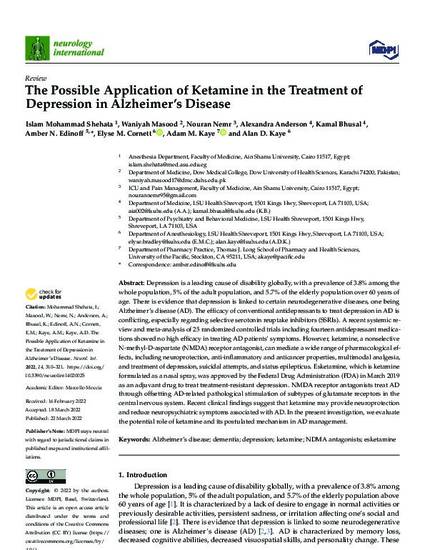
Depression is a leading cause of disability globally, with a prevalence of 3.8% among the whole population, 5% of the adult population, and 5.7% of the elderly population over 60 years of age. There is evidence that depression is linked to certain neurodegenerative diseases, one being Alzheimer's disease (AD). The efficacy of conventional antidepressants to treat depression in AD is conflicting, especially regarding selective serotonin reuptake inhibitors (SSRIs). A recent systemic review and meta-analysis of 25 randomized controlled trials including fourteen antidepressant medications showed no high efficacy in treating AD patients' symptoms. However, ketamine, a nonselective N-methyl-D-aspartate (NMDA) receptor antagonist, can mediate a wide range of pharmacological effects, including neuroprotection, anti-inflammatory and anticancer properties, multimodal analgesia, and treatment of depression, suicidal attempts, and status epilepticus. Esketamine, which is ketamine formulated as a nasal spray, was approved by the Federal Drug Administration (FDA) in March 2019 as an adjuvant drug to treat treatment-resistant depression. NMDA receptor antagonists treat AD through offsetting AD-related pathological stimulation of subtypes of glutamate receptors in the central nervous system. Recent clinical findings suggest that ketamine may provide neuroprotection and reduce neuropsychiatric symptoms associated with AD. In the present investigation, we evaluate the potential role of ketamine and its postulated mechanism in AD management.
Available at: http://works.bepress.com/adam-kaye/180/
